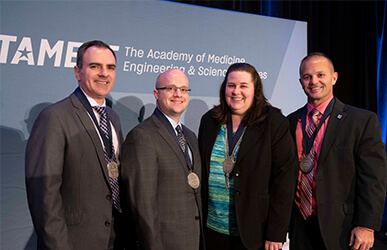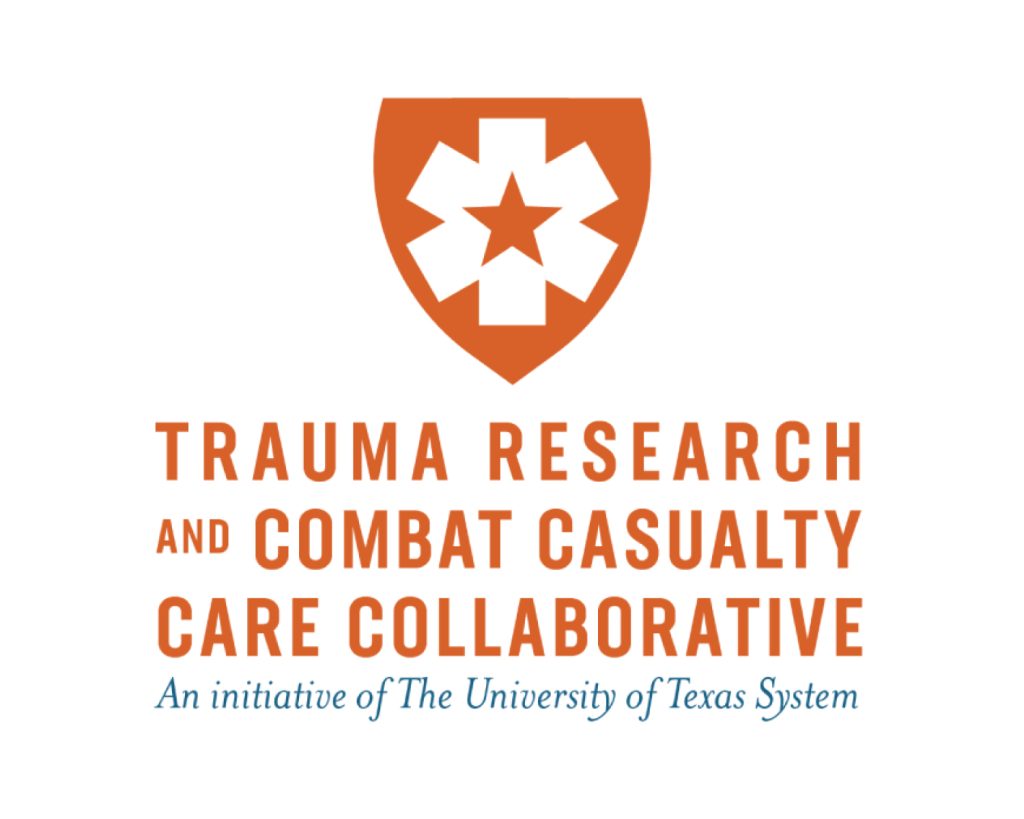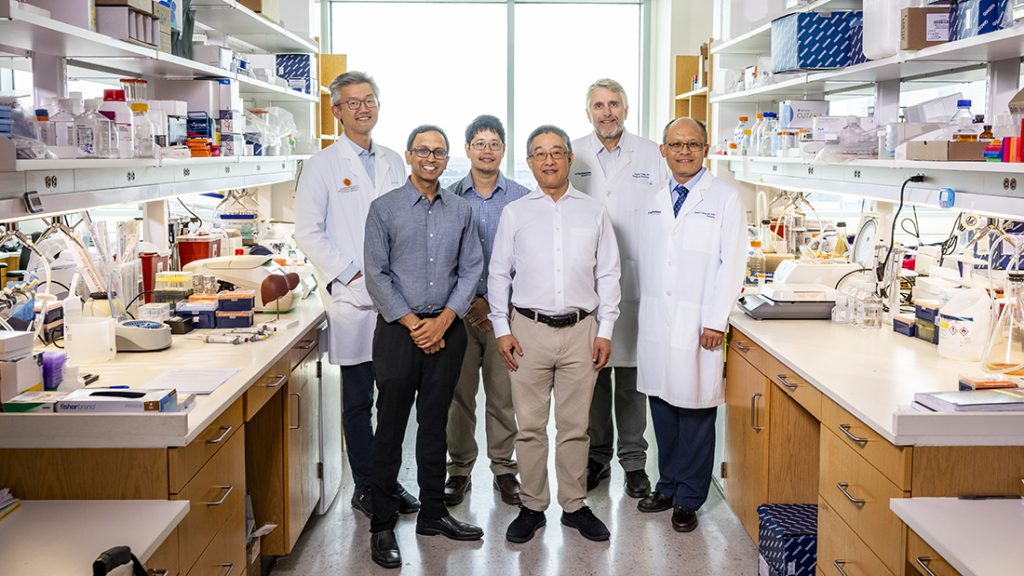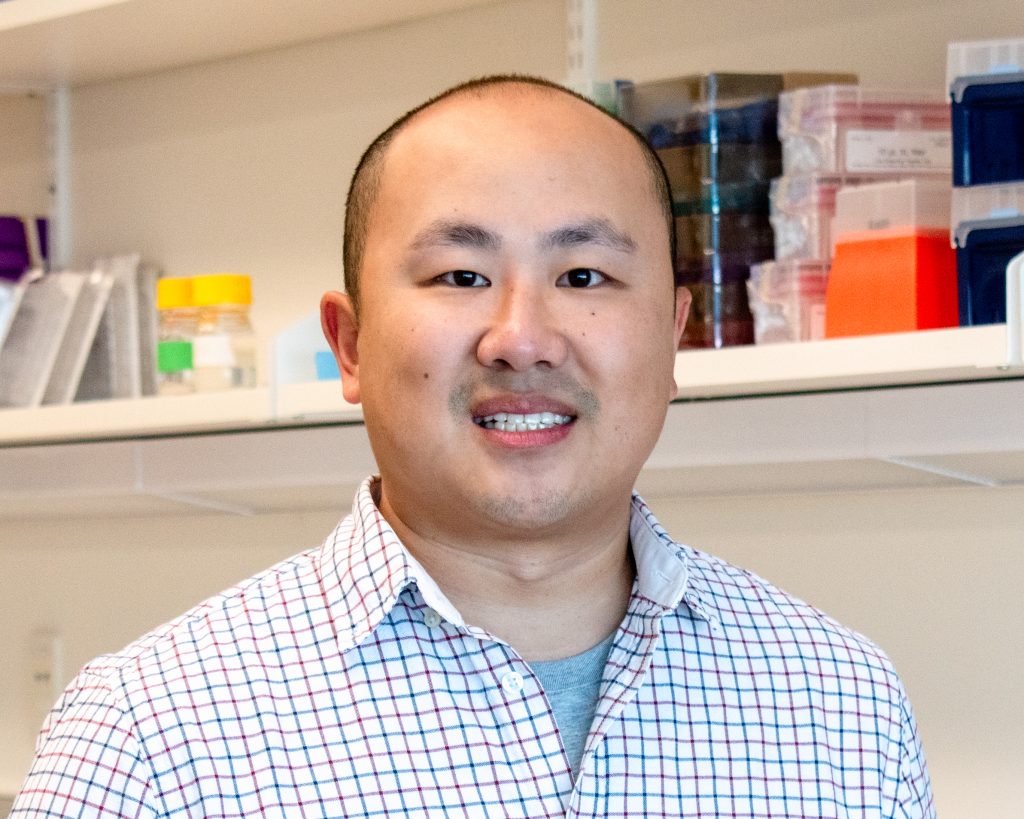
Portraits of Ralph DeBerardinis
Dr. Ralph DeBerardinis – Professor at the Children’s Medical Center Research Institute at UT Southwestern (CRI) and Chief of the Division of Pediatric Genetics and Metabolism at UT Southwestern – has been selected to receive the 2019 Edith and Peter O’Donnell Award in Medicine from The Academy of Medicine, Engineering, and Science of Texas (TAMEST).
Along with fellow UT Southwestern faculty member Dr. Julie Pfeiffer, Dr. DeBerardinis will receive his award Jan. 15 at TAMEST’s annual meeting near Austin, Texas. The O’Donnell Awards – honoring four researchers statewide this year – recognize outstanding achievements by Texas early career investigators in science, medicine, engineering, and technology innovation. Each award consists of a $25,000 honorarium, a citation, a trophy, and an invitation to speak at the conference.
Dr. DeBerardinis is being recognized for his studies on the role of altered metabolism in cancer and in childhood conditions caused by mutations in genes encoding metabolic enzymes. Dr. DeBerardinis, an attending physician at Children’s Health, is also a Howard Hughes Medical Institute (HHMI) Investigator and Director of the Genetic and Metabolic Disease Program at CRI.
“As UT Southwestern concludes its 75thanniversary year, the outstanding science of Dr. Ralph DeBerardinis and Dr. Julie Pfeiffer demonstrates the promise of basic research to lay the foundation for lifesaving new treatments in the coming 75 years,” said Dr. Daniel K. Podolsky, President of UT Southwestern. “We are grateful to Edith and Peter O’Donnell for their vision and generosity in creating these awards.”
Dr. Podolsky holds the Philip O’Bryan Montgomery, Jr., M.D. Distinguished Presidential Chair in Academic Administration, and the Doris and Bryan Wildenthal Distinguished Chair in Medical Science.
Dr. Sean Morrison, CRI Director, Professor of Pediatrics, and an HHMI Investigator, applauded Dr. DeBerardinis’ work, which includes pioneering a new way to study altered metabolism in patients.
In recent work, the DeBerardinis laboratory discovered that lactate is metabolized by growing human lung tumors, a finding that challenges a nearly century-old observation known as the Warburg effect that considered lactate to be a waste product of tumor metabolism. The new finding could prompt a major shift in how researchers view cancer metabolism and open new avenues of study for therapies and imaging techniques in lung cancer, the leading cause of cancer deaths worldwide.
“Ralph’s work has substantially advanced the field of cancer metabolism. From demonstrating the importance of mitochondrial function to using intra-operative isotope tracing in humans, he has changed the methods we use and the way we think about cancer metabolism,” Dr. Sean Morrison said.
Dr. DeBerardinis, a physician-scientist, also credited collaboration for his swift success at UT Southwestern, where he arrived in 2008.
“Teamwork is key to our research, so I’m grateful to my clinical and scientific colleagues at UT Southwestern and CRI,” said Dr. DeBerardinis, also a Professor of Pediatrics and a member of the Eugene McDermott Center for Human Growth and Development at UT Southwestern, where he holds the Joel B. Steinberg, M.D. Chair in Pediatrics. He is also a Sowell Family Scholar in Medical Research and the Robert L. Moody, Sr. Faculty Scholar. He joined CRI soon after its founding in 2012 .
“I’m also grateful to our most important partners: the patients and families who participate in these studies,” he added.
About CRI
Children’s Medical Center Research Institute at UT Southwestern (CRI) is a joint venture of UT Southwestern Medical Center and Children’s Medical Center Dallas, the flagship hospital of Children’s Health. CRI’s mission is to perform transformative biomedical research to better understand the biological basis of disease. Located in Dallas, Texas, CRI is home to interdisciplinary groups of scientists and physicians pursuing research at the interface of regenerative medicine, cancer biology, and metabolism. For more information, visit: cri.utsw.edu. To support CRI, visit: cri.utsw.edu/support/
About UT Southwestern Medical Center
UT Southwestern, one of the premier academic medical centers in the nation, integrates pioneering biomedical research with exceptional clinical care and education. The institution’s faculty has received six Nobel Prizes, and includes 22 members of the National Academy of Sciences, 17 members of the National Academy of Medicine, and 15 Howard Hughes Medical Institute Investigators. The faculty of more than 2,700 is responsible for groundbreaking medical advances and is committed to translating science-driven research quickly to new clinical treatments. UT Southwestern physicians provide care in about 80 specialties to more than 105,000 hospitalized patients, nearly 370,000 emergency room cases, and oversee approximately 2.4 million outpatient visits a year.



